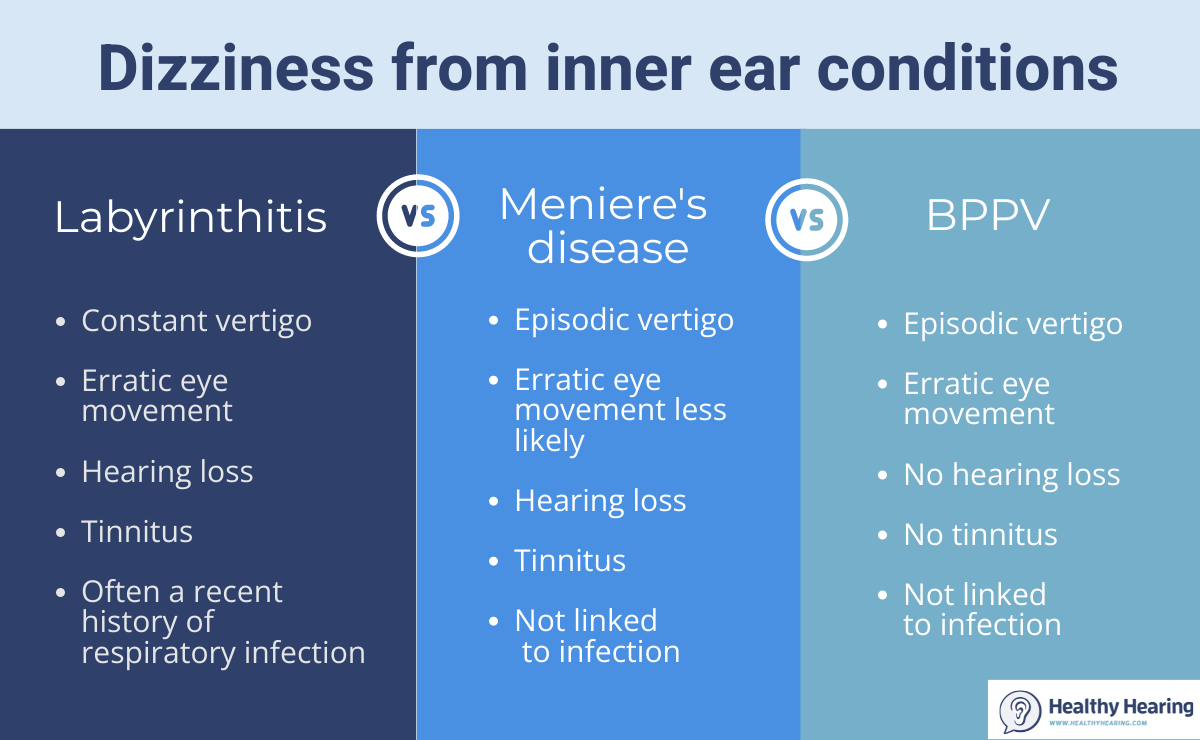|
www.HealthyHearing.com |
Is your dizziness from labyrinthitis, BPPV or Meniere's? How to knowThese inner ear conditions can trigger vertigo and hearing loss
Contributed by Joy Victory, managing editor, Healthy Hearing When you feel dizzy, it’s hard to think about anything else except making it go away. The problem is, it can be tricky to diagnose, because so many things can trigger dizziness. And sometimes, it may be more than just dizziness bothering you, such as hearing loss or tinnitus. Both of these sensations—hearing and balance—are processed in the inner ear, which sends sensory input to the brain that help you hear and stay oriented in your environment. This is known as the audiovestibular system. More: Vertigo, disequilibrium, lightheadedness or presyncope–which dizziness type do you have? When something goes wrong in the inner ear, it can lead to intense vertigo and sometimes hearing loss. It also can trigger disorientation, nausea, and vomiting, a frightening experience. (But note that it is normal to feel anxious or scared when dizzy—after all, you are at increased risk of falling and injury.) With your doctor's help, figuring out which inner ear problem you have is important as the treatment will vary. Let’s take a look at three common ones: labyrinthitis, BPPV and Meniere’s disease.
Labyrinthitis (inner ear infection)When the membrane that surrounds the inner ear (known as the labyrinth) swells or gets inflamed, it can lead to these classic symptoms:
The most common reason this happens is a recent viral infection, including the common cold and middle ear infections. In more rare cases, meningitis and mumps also can infect the inner ear (and so can many infections). How does labyrinthitis affect hearing?When the ear is inflamed, you may struggle to hear, especially higher-pitched sounds. You also may notice ringing in your ears. These changes are usually temporary, especially if you get prompt treatment. In some cases hearing loss and tinnitus may be long-term or even permanent. Benign paroxysmal positional vertigo (BPPV)It may sound strange, but your inner era contains little crystals known as otoconia that help you stay balanced. They move as you move, sending your brain signals about how you’re positioned. If these rocks get stuck or otherwise do something out of the ordinary, vertigo is the result. This is BPPV. It can cause erratic or jerking eye movements, too. The good news: It’s relatively easy to move the loose crystals back into their correct locations, with a physician’s help, of course. After that you’ll feel better fast. How does BPPV affect hearing?It doesn’t, which is the primary way to know it’s not Meniere’s or labyrinthitis, because both of those conditions affect hearing. Also absent is tinnitus and a sense of pressure in your ears. Meniere’s diseasePeople with Meniere’s disease have some of the same symptoms as people with labyrinthitis, including hearing loss, ear ringing, and dizziness. However, it is not an infection, making diagnosis and treatment different. Erratic eye jerking can happen, but isn't as common. How do you know it’s Meniere’s and not labyrinthitis? People with labyrinthitis typically have a history of a recent cold or infection. With Meniere’s, there’s no obvious recent trigger. It also tends to come and go (intermittent), whereas labyrinthitis is intense for a few days and slowly goes away, especially if you get medication. How does it affect hearing?A sense of having clogged ears is common with Meniere's. Long-term, it can lead to low-frequency hearing loss (male voices, thunder, etc, are harder to hear), though any pitch can be affected. Over time, the dizziness may improve but hearing loss may get worse or become permanent. Other possible auditory conditions causing dizzinessVestibular neuritis (or neurontitis)Sometimes a person can develop an inner ear infection that doesn’t cause hearing loss. While treatment is largely the same as labyrinthitis, the name of this condition is different. When no hearing loss is present, it's referred to as vestibular neuritis, since it generally means only the balance organs (the vestibular system) are inflamed and not the entire inner ear labyrinth. Acoustic neuromaAcoustic neuromas are benign tumors can form on the auditory nerves that transmit information to the brain. They can cause dizziness, "double" hearing, facial numbness, headaches and other problems. Get help for dizziness and hearing lossBecause you can’t diagnose these conditions at home, it’s important to get medical treatment. The sooner you get treatment the more likely you are to recover without permanent damage. If you're suffering from dizziness and hearing loss, see your doctor ASAP. They can run a full range of tests to narrow down what's wrong, and get you on the right treatment path. In most cases, you'll want to start with your primary care doctor, or, an ENT, a doctor that specializes in disorders of the ear, nose and throat. Sources:
Joy Victory, managing editor, Healthy Hearing
Related Help Pages:
Hearing loss Causes Middle ear infections Tinnitus (ringing in the ears) Causes Meniere's disease BPPV Dizziness
|
Featured clinics near me
Hearing Health Solutions from Ohio ENT - Columbus
974 Bethel Rd Ste B
Columbus, OH 43214
Earzlink Hearing Care - Reynoldsburg
7668 Slate Ridge Blvd
Reynoldsburg, OH 43068


Find a clinic
We have more hearing clinic reviews than any other site!



 Joy Victory has extensive experience editing consumer health information. Her training in particular has focused on how to best communicate evidence-based medical guidelines and clinical trial results to the public. She strives to make health content accurate, accessible and engaging to the public.
Joy Victory has extensive experience editing consumer health information. Her training in particular has focused on how to best communicate evidence-based medical guidelines and clinical trial results to the public. She strives to make health content accurate, accessible and engaging to the public.